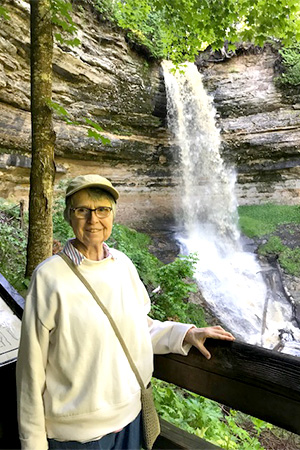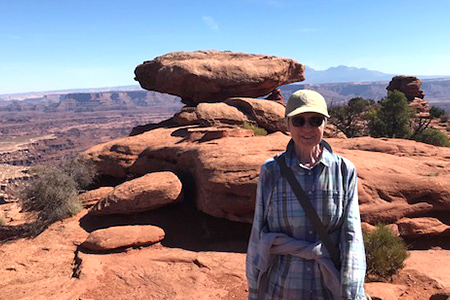Barbara’s Story: Surviving and Thriving After Bladder Cancer
 Back to Exploring the Great Outdoors After Successful Bladder Cancer Treatment
Back to Exploring the Great Outdoors After Successful Bladder Cancer Treatment
After a fulfilling career as a financial analyst and accountant, and while raising three children with her husband, Barbara Moe made a pivotal decision just before turning 60. “I decided to retire. As much as the work was important to me, once I retired, I thought, ‘Why did I wait so long?’”
With newfound time on her hands, Barbara embraced quality moments with her family, especially her grandchildren, while continuing her passion for exploring national parks. “There are 63 national parks, and so far we’ve been to 38 of them. It’s a passion of ours to explore the breathtaking landscapes in Michigan and across the country, where we walk, hike, and soak in the beauty,” said the 72-year-old Dearborn resident.
A surprising discovery
In July 2022, Barbara was caught off guard when she noticed her urine had turned pink, prompting her to seek medical attention. “I thought, if it’s a bladder infection, I need to address this immediately, so I went to Henry Ford Medical Center - Fairlane.” An evaluation followed by a CAT scan revealed a suspicious mass in her bladder, raising concern. “The doctor I saw was very compassionate and she hugged me. I thought, ‘Boy, I think I’m in trouble.’”
A biopsy confirmed the news no one wants to hear; she had bladder cancer. Barbara was referred to Johar Raza, MD, urologic oncologist and director, Bladder Cancer Program at Henry Ford Health for further evaluation. “I can’t say I was shocked at that point, but it was certainly surprising before the CAT scan. I had been active with my grandchildren and hadn’t experienced any pain or issues other than the blood in my urine.”
Putting trust in the Henry Ford medical team
 After meeting with Dr. Raza, Barbara learned that she would need to undergo bladder removal followed by reconstructive surgery to create a new pathway for urinary function. “I had many emotions about what would come next, but Dr. Raza was thorough and very confident. He said, ‘I have a plan for you.’ There weren’t any guarantees, but I felt reassured knowing I was in the hands of a skilled team.”
After meeting with Dr. Raza, Barbara learned that she would need to undergo bladder removal followed by reconstructive surgery to create a new pathway for urinary function. “I had many emotions about what would come next, but Dr. Raza was thorough and very confident. He said, ‘I have a plan for you.’ There weren’t any guarantees, but I felt reassured knowing I was in the hands of a skilled team.”
Barbara's case was not a typical one to deal with according to Dr. Raza. “Based on my operative findings, I thought of leaving her without a urinary diversion, so that she could start treatment as soon as possible. However, she would be left with tubes coming out her back to drain the urine,” he says. “This was a tough ask, but Barbara embraced it with great courage.” Dr. Raza explains once Barbara was tumor free at the first scan, following completion of her chemotherapy, a conventional diversion was performed, getting rid of the tubes hanging out of her back. Nabeel Shakir, MD, director of reconstructive urology, made an ileal conduit diversion for her using the small bowel, allowing urine to come out of the belly. “The most crucial thing here is that like pieces of a puzzle, everything came together perfectly. Now Barbara and her husband are travelling across the country, exploring national parks and enjoying their favorite hobby," Dr. Raza expresses.
Part of her treatment plan was managed by Clara Hwang, MD, medical oncologist at Henry Ford Health, who specializes in bladder cancer treatment. It included four cycles of chemotherapy, followed by immunotherapy, which Dr. Hwang describes as an important part of the comprehensive treatment plan.
“Cancer immunotherapy helps the immune system recognize and attack cancer cells more effectively and reduces the risk of bladder cancer coming back,” she notes. Her cancer is currently in remission but she is being monitored for recurrence.”
Finding the strength to persevere
Barbara expresses that her physical and mental wellbeing were maintained by walking throughout her bladder cancer journey. “I was walking before and after surgeries. I was walking during chemotherapy. Even when I was not feeling well, I was determined to walk.” Her goal was to walk two to three times a week. Sometimes she would walk at least a mile but other times, she walked around the block. “I often went to The Henry Ford Museum to walk indoors. It was much easier during immunotherapy. I was feeling better, getting stronger, walking more often, walking farther. I was getting back my strength and stamina.”
From cancer clinic to survivor’s clinic
 Barbara is delighted to share that, thanks to her comprehensive treatment, she has completed her cancer care and graduated from the cancer clinic to the survivor’s clinic, where she will be monitored but can now refocus on family time and checking off more national parks from her list.
Barbara is delighted to share that, thanks to her comprehensive treatment, she has completed her cancer care and graduated from the cancer clinic to the survivor’s clinic, where she will be monitored but can now refocus on family time and checking off more national parks from her list.
Her hope is to inspire others to take charge of their journey and write their own story.
“This experience has taught me that a positive attitude and hope, even in despair, can significantly impact your journey. Coupled with the multidisciplinary team of experts at Henry Ford who worked harmoniously to create the best treatment plan, I truly believe I couldn’t have received better care anywhere else.”
For further information visit bladder cancer care at Henry Ford Health.
.svg?iar=0&hash=F6049510E33E4E6D8196C26CCC0A64A4)

/hfh-logo-main--white.svg?iar=0&hash=ED491CBFADFB7670FAE94559C98D7798)
